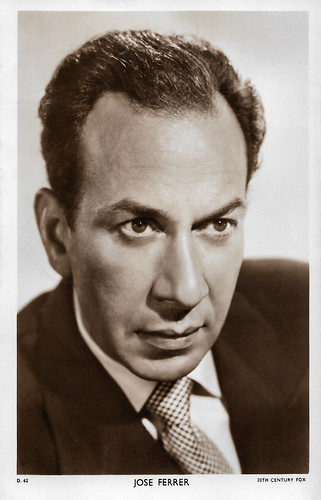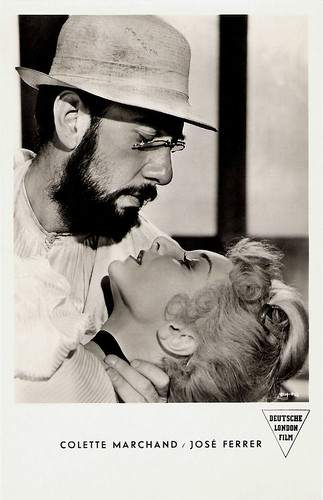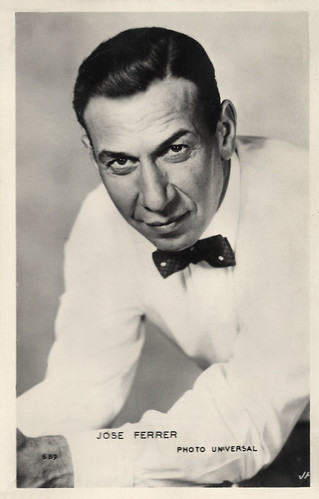
West German postcard by Rüdel Verlag, Hamburg Bergedorf, no. 654. Photo: Romulus / Deutsche London Film. José Ferrer in Moulin Rouge (John Huston, 1952).

Belgian postcard, no. 5464. José Ferrer in I Accuse! (José Ferrer, 1958).

British postcard in the Picturegoer Series, London, no. D. 62. Photo: 20th Century Fox.
A major success on Broadway
José Ferrer was born José Vicente Ferrer de Otero y Cintrón in San Juan, the capital city of Puerto Rico in 1912. Ferrer's father was Rafael Ferrer, a lawyer, landowner and author who was born and raised in San Juan. Ferrer's mother was María Providencia Cintrón, a native of the coastal town of Yabucoa. Ferrer's paternal grandfather was Dr. Gabriel Ferrer Hernández, who had campaigned for Puerto Rican independence from the Spanish Empire.
The Ferrer family moved to New York City in 1914, when José was 2 years old. As a school student, Ferrer was educated abroad at the Institut Le Rosey, a prestigious boarding school located in Rolle, Switzerland. According to the wishes of his father, José should become a concert pianist. Ferrer studied architecture, music and composition at Princeton University. He wrote a dissertation called 'French Naturalism and Pardo Bazán', about the Spanish naturalist writer Emilia Pardo Bazán. In 1934, Ferrer transferred to Columbia University, where he studied Roman languages.
In 1934, while still a college student, Ferrer made his theatrical debut in Long Island-based theatre. In 1935, he was hired as the stage manager at the Suffern Country Playhouse. Later in 1935, Ferrer made his Broadway debut in the comedy play 'A Slight Case of Murder' by Damon Runyon and Howard Lindsay. Ferrer had a major success on Broadway in the play 'Brother Rat' by John Monks Jr. and Fred F. Finklehoffe. The play ran 577 performances from 1936 to 1938. Very successful were also 'Mamba's Daughters (1938) and 'Charley's Aunt' (1940).
Even more successful was the 1943 play 'Othello' in which he co-starred as the villainous Iago opposite the Othello of Paul Robeson. 'Othello' was the longest-played Shakespeare play in the United States. The record remains unbroken to this day. In 1946, Ferrer starred in 'Cyrano de Bergerac', his most successful play. He won a Tony Award for his performance.
In 1948, Ferrer made his film debut by co-starring with Ingrid Bergman in Joan of Arc (Victor Fleming, 1948). He played the historical monarch Charles VII of France, the ruler who Joan of Arc served during the Hundred Years' War. For his debut role, Ferrer was nominated for an Oscar for Best Male Supporting Actor. Ferrer's success as a film actor, helped him gain more film roles in Hollywood-produced films. He played the smooth-talking hypnotist David Korvo in the Film Noir Whirlpool (Otto Preminger, 1949) with Gene Tierney, and dictator Raoul Farrago in the Film Noir Crisis (Richard Brooks, 1950) starring Cary Grant. In 1950, Ferrer won an Oscar for Best Actor for his role as Cyrano de Bergerac in the film version, Cyrano de Bergerac (Michael Gordon, 1950). He was the first Puerto Rican actor and also the first Hispanic actor to win an Academy Award.

Italian postcard by Rotalfoto, Milano. Photo: Paramount. Kim Hunter and José Ferrer in Anything Can Happen (George Seaton, 1952).

German postcard. Photo: Deutsche London Film. José Ferrer and Colette Marchand in Moulin Rouge (John Huston, 1952).

Italian postcard by Rotalfoto, Milano. Photo: Paramount. Kim Hunter and José Ferrer in Anything Can Happen (George Seaton, 1952).
Moulin Rouge
In 1952, José Ferrer won three Tony Awards for directing three plays, namely 'The Shrike', 'Stalag 17' and 'The Fourposter' and he won another Tony for acting in 'The Shrike'. That year, Ferrer also played the French painter Henri de Toulouse-Lautrec in the historical drama Moulin Rouge (John Huston, 1952). His role earned him an Oscar nomination, but the award was instead won by Gary Cooper. The film also marked a financial success for Ferrer, who received 40% of the film's profits.
In 1954, Ferrer took on the role of defence attorney Barney Greenwald in The Caine Mutiny (Edward Dmytryk, 1954) opposite Humphrey Bogart. The film was a huge hit. Also popular was Deep in My Heart (Stanley Donen, 1955) about the life of operetta composer Sigmund Romberg (Ferrer), which made a profit of over $1 million.
From 1955 onwards, Ferrer also directed a number of films, most of which he also starred in as an actor. First, he directed a film version of The Shrike (José Ferrer, 1955), in which he also starred opposite June Allyson. He went to England to star in and direct a war film for Warwick Productions, The Cockleshell Heroes (1955), alongside Trevor Howard. It was a success at the British box office. For MGM, he directed and starred in two films, I Accuse! (José Ferrer, 1958), a reimagining of the Dreyfus Affair, in which he played Captain Alfred Dreyfus, and The High Cost of Loving (José Ferrer, 1958) a comedy with Gena Rowlands.
While still critically well-received, several of his films were box office flops. He took a hiatus from film productions. In 1959, he directed a play called 'The Andersonville Trial', about the consequences of the American Civil War. The play featured George C. Scott. He then took over directing the musical 'Juno'. After sixteen performances, the musical stopped due to a lack of success, which was a setback for Ferrer's directing career.
Ferrer attempted a comeback as a film director with the sequel film Return to Peyton Place (José Ferrer, 1961) and the musical film State Fair (José Ferrer, 1962). Both films were again box office flops. As an actor, Ferrer appeared as a Turkish Bey in the historical drama Lawrence of Arabia (David Lean, 1962) with Peter O'Toole, as historical monarch Herod Antipas, Tetrarch of Galilee and Perea in the Bible epic The Greatest Story Ever Told (1965) and as one of the doomed passengers in Ship of Fools (Stanley Kramer, 1965). The latter film was nominated for eight Academy Awards in 1966.
In between, Ferrer went to Germany to make Verspätung in Marienborn/Stop Train 349 (Rolf Hädrich, 1963) with Sean Flynn. He then appeared opposite Jean-Pierre Cassel in the French film Cyrano et d'Artagnan/Cyrano and d'Artagnan (1964) directed by Abel Gance. In television, Ferrer was the narrator in the pilot episode of the hit sitcom Bewitched (1964), which he narrated in a mock documentary style. In 1968, he featured as a voice actor, playing the villain Ben Haramed in the stop-motion television special The Little Drummer Boy (Jules Bass, Arthur Rankin Jnr., 1968). But at this time, he started having legal troubles. The Internal Revenue Service (IRS) accused Ferrer of still owing unpaid taxes since 1962.

Italian postcard by B.F.F. Edit. (Casa Editr. Ballerini & Fratini, Firenze), no. 2993. Photo: Universal C.E.I.A.D.

Italian postcard by Bromostampa, Milano, no. 71. José Ferrer in The Caine Mutiny (Edward Dmytryk, 1954).

French postcard by Editions P.I., Paris, no. 689. Photo: Universal.
No outstanding highlights
José Ferrer had many film roles in the 1970s, but no outstanding highlights. He played one of the many passengers in Voyage of the Damned (Stuart Rosenberg, 1976) with Faye Dunaway, Doctor Vando in Fedora (Billy Wilder, 1978) with William Holden and Marthe Keller, and musketeer Athos in The Fifth Musketeer (Ken Annakin, 1979), starring Beau Bridges and Sylvia Kristel.
In the 1980s, he starred in the popular comedy series Newhart as Julia Duffy's father, and he also played the role of Reuben Marino in the soap opera Another World. In the cinema, he appeared in A Midsummer Night's Sex Comedy (Woody Allen, 1982), To Be or Not to Be (Mel Brooks, 1983) and Dune (David Lynch, 1984), an adaptation of the 1965 novel 'Dune' by Frank Herbert. This was among the last notable roles of Ferrer's long career.
Ferred retired from acting entirely in 1991, due to increasing health problems. His last theatrical performance was a production of the generation-gap drama 'Conversations with My Father'. In 1992, José Ferrer died of colorectal cancer at the age of 80 in Coral Gables, Florida. He was buried in Santa Maria Magdalena de Pazzis Cemetery in Old San Juan in his native Puerto Rico.
José Ferrer, who spoke perfect French, Italian and German in addition to Spanish and English, was married a total of four times. His wives were Uta Hagen (1938-1948), actress Phyllis Hill (1948-1953) and the singer and actress Rosemary Clooney (1953-1961 / 1964-1967). From 1977 until his death, he was married to Stella Magee.
With Uta Hagen, he had a daughter. With Rosemary Clooney, he had five children born between 1955 and 1960. His oldest son, actor Miguel Ferrer (1955-2017) was known for his role in Medical Examiners. He was followed by Maria Ferrer (1956), Gabriel Ferrer (1957) who is married to singer Debby Boone, daughter of Pat Boone; Monsita Ferrer (1958) and Rafael Ferrer (1960). Ferrer was the uncle of film star George Clooney.

Italian postcard by Bromofoto, Milano, no. 953. Photo: Columbia C.E.I.A.D.

French postcard by Editions P.I., Paris, no. 689. Photo: Universal.

British postcard in the Celebrity Autograph Series, no. 248. Photo: Universal-International. José Ferrer in The Shrike (José Ferrer, 1955).
Sources: Dimos I (IMDb), Wikipedia (English, German and Dutch) and IMDb.
No comments:
Post a Comment